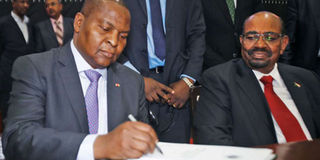Armed groups get four posts in new C. Africa govt

Central African President Faustin-Archange Touadera (L) signs a peace deal next to Sudanese President Omar al-Bashir in Khartoum on February 5, 2019. PHOTO | ASHRAF SHAZLY | AFP
What you need to know:
- The peace deal -- the eighth since 2012 in the conflict-wracked, impoverished state -- brought together the CAR government and 14 armed groups who control most of the country.
- Four members of the armed groups who were signatories to the deal are now in government.
- They include Abdoulaye Miskine, head of the Democratic Front of the Central African People (FDPC), who becomes minister in charge of modernisation.
BANGUI,
The new government of Central Africa, appointed by presidential decree on Friday, includes ministers from armed groups that signed last month's peace deal.
Under the provisions of a peace accord -- signed in the CAR capital Bangui on February 6 -- President Faustin-Archange Touadera agreed to form an "inclusive" government.
But within weeks, the deal was under strain -- five militia groups either pulled out of the new government or rejected its makeup.
Four members of the armed groups who were signatories to the deal are now in government.
They include Abdoulaye Miskine, head of the Democratic Front of the Central African People (FDPC), who becomes minister in charge of modernisation.
Mr Miskine is a former ally of the Seleka rebels, an armed coalition of Islamist groups who seized power in the CAR capital Bangui between March and December 2013.
CONFIDENCE-BUILDING
The bulk of the appointments announced earlier however, remain unchanged, in particular the main ministries.
The peace deal -- the eighth since 2012 in the conflict-wracked, impoverished state -- brought together the CAR government and 14 armed groups who control most of the country.
In addition to an inclusive government, the agreement called for a series of confidence-building measures, such as establishing joint patrols and the creation of a truth and justice commission within 90 days.
CAR has been struggling to recover from the bloodletting that erupted when former president Francois Bozize, a Christian, was overthrown in 2013 by the Seleka rebels.
MINERAL WEALTH
Former colonial ruler France intervened militarily under a UN mandate, pushing the Seleka from power, and a 12,000-strong UN peacekeeping mission, known as MINUSCA, was established to help restore stability.
Despite the elections in 2016 that brought Mr Touadera to power, the country remains convulsed by violence.
Armed groups, typically claiming to defend an ethnic or religious group, control about 80 percent of the CAR, often fighting over access to the country's mineral wealth.
The conflict has left thousands dead and forced a quarter of the population of 4.5 million from their homes.





